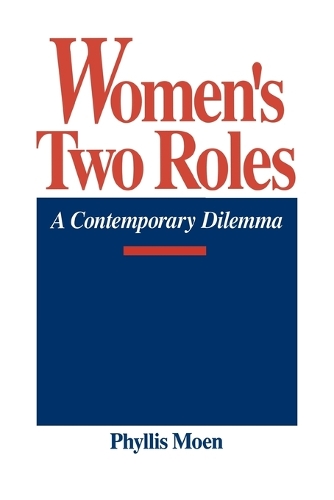
Women's Two Roles: A Contemporary Dilemma
(Paperback)
Available Formats
Publishing Details
Women's Two Roles: A Contemporary Dilemma
By (Author) Phyllis Moen
Bloomsbury Publishing PLC
Praeger Publishers Inc
12th May 1992
United States
Classifications
Tertiary Education
Non Fiction
Sociology: work and labour
305.42
Physical Properties
Paperback
192
Description
Phyllis Moen describes the meshing of work and family roles not only as the private dilemma of individual women and their families but also as a public dilemma for the nation. This is an issue linked to deep apprehensions about families' and children's well-being, to demands for gender equality, to the outcry of some for a return to the traditional wife-as-homemaker role, and to growing concerns about labor market needs, productivity and economic competitiveness. Moen addresses the following central questions: What are the major implications - for society, families, husbands, children and women themselves - of the substantial and progressive movement of American women into the labor force The dominant focus is on employed mothers of young children (those under the age of six) since it is these women who have experienced the greatest change and who encounter the greatest difficulty in reconciling employment demands and family responsibilities. An overriding theme is the uneveness of social change; American mothers of young children may be moving into the labor force in unprecendented numbers, but husbands, employers and public policies are slow to accommodate this emerging reality. The issues raised are of concern to a broad spectrum of "the educated public", but the book should be no less valuable to social scientists seeking to extend their knowledge of issues in this area of growing concern and can be used in courses relating to the sociology of the family, social problems, gender roles and social policy.
Reviews
Although numerous books and articles have described the stresses and strains experienced by employed women and their families, this book contains new, relevant information. With a sense of urgency, Moen identifies differences in women's approaches to combining work and family roles by examining, among other issues, the diversity of their work commitment. Moen argues that employed women with families generally fit one of four topologies: "captives," "conflicted," "copers," and "committed." Trend analysis, a technique that receives considerable attention throughout her book, reveals that captives (working women whose family cares make them unwilling employees) are declining while committed workers (well-educated career women whose family plans are often delayed) are increasing. Moen brings new information and insights into the costs for women and for young children of mothers' combining two roles. Finally, this book includes logical arguments for transforming the structure of work and for reconfiguring the patterns of education-work-retirement over women's--as well as men's--life course. Advanced undergraduate; graduate; faculty.-Choice
Superb supplementary text ideally suited for courses in the sociology of gender or in women's studies.-Cooperative Economics News Service
The topic, length, and level make it an ideal candidate for an advanced undergraduate course on gender. Professionals and graduate students would find it a useful overview. As it stands, the book's strengths are Moen's clear statement of the societal nature of the problem and the need for societal solutions and the wealth of trend data she skillfully compiles.-American Journal of Sociology
"Superb supplementary text ideally suited for courses in the sociology of gender or in women's studies."-Cooperative Economics News Service
"The topic, length, and level make it an ideal candidate for an advanced undergraduate course on gender. Professionals and graduate students would find it a useful overview. As it stands, the book's strengths are Moen's clear statement of the societal nature of the problem and the need for societal solutions and the wealth of trend data she skillfully compiles."-American Journal of Sociology
"Although numerous books and articles have described the stresses and strains experienced by employed women and their families, this book contains new, relevant information. With a sense of urgency, Moen identifies differences in women's approaches to combining work and family roles by examining, among other issues, the diversity of their work commitment. Moen argues that employed women with families generally fit one of four topologies: "captives," "conflicted," "copers," and "committed." Trend analysis, a technique that receives considerable attention throughout her book, reveals that captives (working women whose family cares make them unwilling employees) are declining while committed workers (well-educated career women whose family plans are often delayed) are increasing. Moen brings new information and insights into the costs for women and for young children of mothers' combining two roles. Finally, this book includes logical arguments for transforming the structure of work and for reconfiguring the patterns of education-work-retirement over women's--as well as men's--life course. Advanced undergraduate; graduate; faculty."-Choice
Author Bio
PHYLLIS MOEN is Director of Cornell Life Course Institute and Professor of Human Development and Family Studies and of Sociology at Cornell University. Among her earlier publications are Working Parents: Transformations in Gender Roles and Public Policies in Sweden (1989) and numerous articles in scholarly journals.
